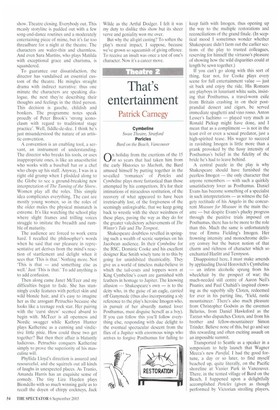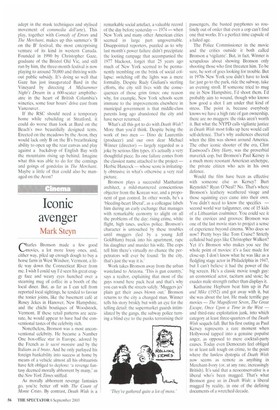'that's entertainment
Patrick Camegy
Cymbeline Swan Theatre, Stratford Pericles Bard on the Beach, Vancouver (In holiday from the exertions of the 15 l_lor so years that had taken him from the early Histories to Macbeth, the Bard amused himself by putting together in the so-called 'romances' of Pericles and Cymbeline plays more fantastical than those attempted by his competitors. It's for their intimations of miraculous restitution, of the recovery of what appeared to have been irretrievably lost, of the forgiveness of the seemingly unforgivable, that we keep going back to wrestle with the sheer weirdness of these plays, paving the way as they do for the greater valedictory achievements of The Winter's Tale and The Tempest.
Shakespeare doubtless revelled in springing such a wealth of scenic surprises on his Jacobean audience. In their Cymbeline for the RSC, Dominic Cooke and his excellent designer Rae Smith wisely tune in to this by going for uninhibited theatricality. They give us a world of timeless make-believe in which the tail-coats and toppers worn at King Cymbeline's court are garnished with feathers in homage to Jupiter. The knowing allusion — Shakespeare's own — is to the deity who, in the guise of an eagle, carried off Ganymede (thus also incorporating a sly reference to the play's heroine Imogen who, in pursuit of her absurdly named lover Posthumus, must disguise herself as a boy). If you can follow this you'll follow everything else, responding with due delight to the eventual spectacular descent from the flies of a Jupiter with enormous wings who arrives to forgive Posthumus for failing to
keep faith with Imogen, thus opening up the way to the multiple restorations and reconciliations of the grand finale. (In sceptical mood I sometimes wonder whether Shakespeare didn't farm out the earlier sections of the play to trusted colleagues, reserving for himself the virtuoso's pleasure of showing how the wild disparities could at length be sewn together.)
If you can't go along with this sort of thing, fear not, for Cooke plays every scene for full entertainment value — just sit back and enjoy the ride. His Romans are playboys in luxuriant white suits, insisting that Posthumus, a travel-worn exile from Britain crashing in on their postprandial dessert and cigars, be served immediate spaghetti and vino rosso. Anton Lesser's Iachimo — played very much as Ronald Pickup might have done, and I mean that as a compliment — is not in the least evil or even a sexual predator, just a high-spirited tease. His wager to succeed in ravishing Imogen is little more than a prank provoked by the fussy intensity of Posthumus's belief in the fidelity of the bride he's had to leave behind, A central puzzle in the play is why Shakespeare should have furnished the peerless Imogen — the only character that anyone remembers — with such a quirkily unsatisfactory lover as Posthumus. Daniel Evans has become something of a specialist in such interpretations — as witness the fidgety rectitude of his Angelo in the concurrent Measure for Measure in the main theatre — but despite Evans's plucky progress through the punitive trials imposed on Posthumus, there has to be more to the role than this. Much the same is unfortunately true of Emma Fielding's Imogen. Her frowning intensity and monochrome delivery convey but the barest notion of that charm and richness of character which so enchanted Hazlitt and Tennyson.
Disappointed here, I must make amends by applauding David Horovitch's Cymbeline — an infirm alcoholic sprung from his wheelchair by the prospect of war; the much-needed still centre of Aaron Neil's Pisanio; and Paul Chahidi's inspired clowning as the superbly silly Cloten, redeemed for ever in his parting line, 'Yield, rustic mountaineer.' There's also much pleasure from Christopher Godwin as the caveman Belarius, from Daniel Hawksford as the Tarzan who dispatches Cloten, and from his brother and fellow-mountaineer Simon Trinder. Believe none of this, but go and see this rewarding and often exciting assault on an impossible summit.
Transported to Seattle as a speaker in a symposium to help launch that Wagner Mecca's new Parstfal, I had the good fortune, a day or so later, to find myself beached up, quite literally, on the Pacific shoreline at Vanier Park in Vancouver. There, in the tented village of Bard on the Beach, I happened upon a delightfully accomplished Pericles (given as though performed by Victorian strolling players,
adept in the mask techniques and stylised movement of commedia del/uric). This play, together with Comedy of En-ors and The Merchant, makes up this summer's '13 on the B' festival, the most enterprising venture of its kind in western Canada. Founded in 1990 by Christopher Gaze, graduate of the Bristol Old Vic, and still run by him, the three-month festival is now playing to around 70,000 and thriving without public subsidy. It's doing so well that Gaze has just inaugurated Bard in the Vineyard by directing A Midsummer Night's Dream in a 600-seater amphitheatre in the heart of British Columbia's wineries, some four hours' drive east from Vancouver.
If the RSC should need a temporary home while rebuilding at Stratford, it could do worse than look at Bard on the Beach's two beautifully designed tents. Erected on the meadows by the Avon, they would lack only B on the B's breathtaking ability to open up the rear canvas and play against a backdrop of English Bay with the mountains rising up behind. Imagine what this was able to do for the comings and goings of gondolas in The Merchant. Maybe a little of that could also be managed on the Avon?











































































 Previous page
Previous page